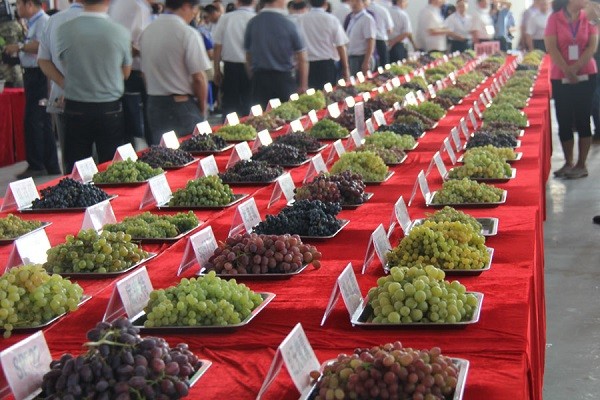A part of the ancient Silk Road or Silk Route (around 114 B.C. to 1450s), Turpan in Xinjiang Uyghur Autonomous Region prides itself with a long and colorful history, and those who want to have a taste of it may start by taking a bite of its legendary grapes.
This year marks the 24th Silk Road Grape Festival or Turpan Grape Festival, and festivities kicked off on Aug. 20 and will culminate on Sept. 6.
An annual event first organized in 1990, the celebration is typically from Aug. 20 until Sept. 5. In 2012, it started on Aug. 26.
A string of activities delight both local and foreign participants during the long festival.
For one, there is the grape eating contest. Music and dancing are also perennial features of the festival. Folk dance, art performances and other cultural-related performances are staged.
As expected, the chance to taste the most famous Turpan produce is wide open, with more than 160 types to sample.
Akram, a 43-year-old who has been growing grapes since his teenage years, said that the grapes in Turpan are sweeter than those grown in other parts of the country. His family doesn’t use pesticides, which makes their grapes “healthy and natural,” reported CRIEnglish.
Temperature in Turpan can reach a scorching 40 degrees Celsius, particularly during summer.
With the generous amount of sunlight bathing the city, the grapes grow in abundance and as sweet as they could get. It is not surprising then that people would often refer to Turpan as the “hometown of grapes,” according to China Travel Guide.
Turpan’s wuhebai grapes or Thompson seedless grapes (also known as “sultania”) are renowned for their taste, earning the title of being China’s "green pearls."
Other grapes grown in the city include the bijiagan grapes, black grapes, Kashihar grapes, manaizi or the “horse nipple” grapes (in reference to their shape), red grapes, and suosuo grapes.
In 2014, the festival was held for the first time in Changsha (Aug. 16-17), Beijing (Aug. 23-24) and Shanghai (Aug. 30-31). In 2012, the festival organizers made the celebration extra memorable by holding it in a seemingly unlikely place: in a desert.
The 21st anniversary of the festival took place in Kumtag Desert, a government-declared national park in Shanshan County.
“Turpan” means “fertile ground” in Turki language, the one used by Turkic peoples living in northwestern China. Cantaloupes also grow plentifully in Turpan, along with apricots, mulberries and watermelons.
Of course, with so many grapes available during the festival, wine tasting wouldn’t be far behind.
However, it might be for one’s own good to drink in moderation, for the best way to enjoy all the merrymaking the grape festival offers is to remain sober until the end.




























